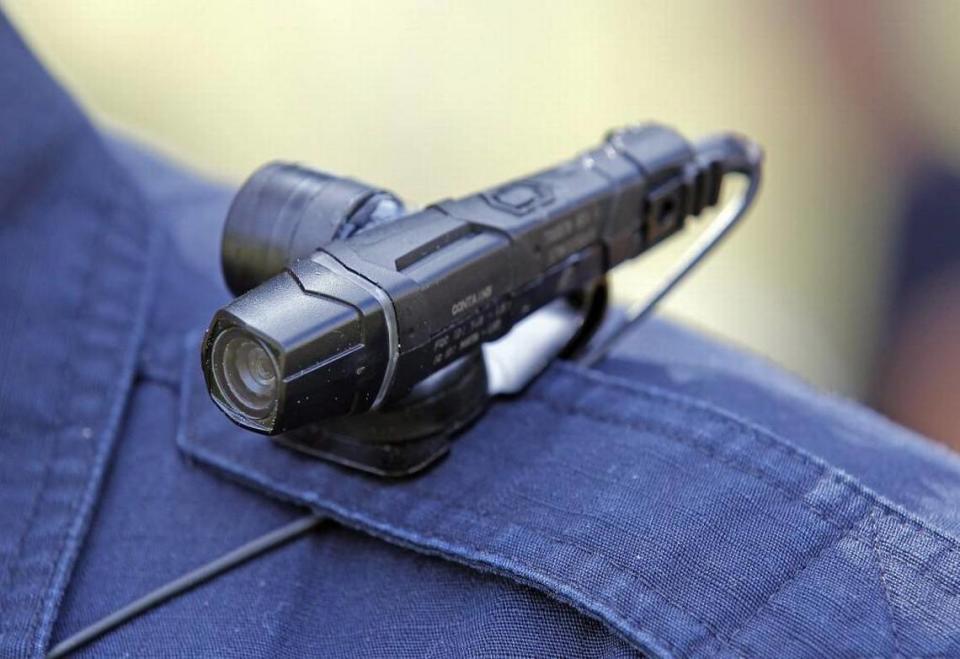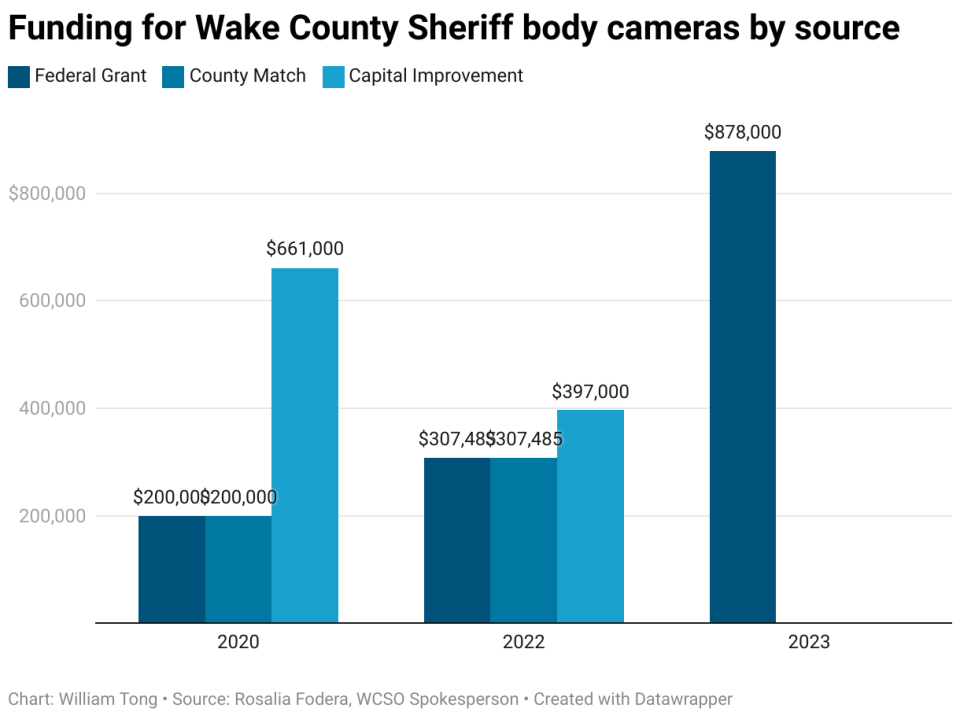After 2 shootings by deputies in NC, why there’s body-cam video for only one of them
Sheriff’s deputies in the Triangle area shot two men this month. The State Bureau of Investigation will be able to review body camera footage in only one of the cases.
Wake County sheriff’s deputies wore body cameras during a June 18 incident in which a man they were trying to evict from an apartment got shot.
The Johnston County deputy who shot a man accused of trying to grab his gun June 10 in a hospital parking lot was not wearing a body camera. Johnston’s sheriff’s office doesn’t use body-worn or dash cameras. UNC Health Johnston hospital did provide its security footage to the SBI, a spokesperson confirmed.
Not all local sheriff’s offices have body cameras. Those that do say the devices are worth the costs, backing up their officers after controversial interactions with the public. Police-reform advocates say cameras provide transparency, despite obstacles to obtaining recordings.
“Unequivocally, any law enforcement leader that is putting badges and guns on their employees and sending them out into the world to fight crime that does not put a body-worn camera on that officer or deputy or trooper is making a huge, huge mistake,” said Orange County Sheriff Charles Blackwood, former president of the N.C. Sheriff’s Association.
Weighing priorities in Johnston County
Johnston County Sheriff Steve Bizzell said he has prioritized construction of new detention and public safety centers for the last four years. But he’s not against body cameras, he said.
“It’s just another item on our long list of things we do at the sheriff’s office on a daily basis,” he said. “We need to get this off the back burner.”
While he’s concerned body cameras could make some residents less willing to talk to deputies, the devices are an important investigative tool, he said.
His staff has looked at vendors for body cameras but needs to find affordable equipment, Bizzell said. The office had dash cameras, but they reached the end of their operable life. To get a good cost on cameras, “sometimes it’s worth the wait,” Bizzell said.
And if a deputy shoots someone during that wait?
“You can sit back here and be a Monday-morning quarterback, but I see the pros and I see the cons,” he said.
Accountability effects unclear
Proponents say body cameras provide a transparent account of law enforcement interactions with the public.
In North Carolina, however, law enforcement agencies have to petition a judge to share the recordings with the public.
“Those videos can be requested,” said Wake County Sheriff’s Lt. Joe Fisher. “It can be viewed if you go through the right channels. So it’s an effort of transparency.”
Attorney Dawn Blagrove, executive director at Emancipate NC, said cameras could help “course-correct” inappropriate behavior, but haven’t always lived up to their potential.
“Body camera footage was very promising,” she said. “What we’ve actually seen happen is very little change from the law enforcement culture and community.”
The state’s disclosure process lets government institutions control what the public can see, Blagrove said. Emancipate NC has had to pressure agencies into releasing body camera footage, she said.
Still, seeing some footage is better than none, Blagrove said.
“It validates the lived experiences that so many Americans have had with law enforcement,” she said.
What the footage has shown
Police departments in the Triangle have released body camera footage after several fatal shootings by officers. Cases include:
A man who was shot 11 times in 2022 after throwing ignited flammable liquid at Raleigh police. One officer had goaded the man — whose family said he struggled with mental health issues — to throw the container of liquid before the shooting.
A man who was shot at seven times — one bullet striking him in the head — in 2023 after shooting at police and parked cars near a Raleigh middle school.
A man who was shot at 18 times in February after ignoring officer commands to drop his gun. He was walking toward a truck, facing away from a Raleigh police officer.
In all three cases, Wake County District Attorney Lorrin Freeman chose not to charge officers with a crime for killing the suspects, deeming their uses of force “justified.”
Freeman said body camera footage is only one piece of evidence she uses to make decisions about use of force.
“In those situations where the incident is clearly captured, it can make a big difference in being able to determine what happened,” she said.
Otherwise, the SBI and district attorney use forensic evidence and eyewitness testimony to evaluate uses of force, Freeman said.
Despite decisions to generally not press charges, body camera footage is still beneficial, said Kerwin Pittman, Emancipate NC’s development director.
“It gives the public the ability to be able to see when they are released and to hold these individuals accountable who choose not to prosecute,” said Pittman, a member of the state’s Task Force For Racial Equity In Criminal Justice.
Ongoing implementation
Sheriff’s offices often trail municipal police departments in integrating body cameras, especially in large urban areas. Raleigh police started using them in 2018, Cary in 2019 and Apex in 2020.
At the Wake County Sheriff’s Office, body camera implementation began in 2021. Matching federal Department of Justice grant funding, the office bought 200 cameras for $400,000. That money covered most officers who interact with the public regularly, according to spokesperson Rosalia Fodera.
Large local investment followed. Wake County allocated $661,000 for camera maintenance costs, Fodera said. That includes money for hardware repairs and replacement, but also digital storage.
Internally, body cameras can help evaluate officers’ interactions with the public, Fisher said.
“It allows supervisors to go back and monitor how deputies handled certain calls for service,” he said. “Were policies followed? Did they treat the public with respect?”
But the devices haven’t changed officer behavior, which has been “appropriate” with or without cameras, he said.
At the end of 2023, the Wake Sheriff’s Office secured another grant — this time, to outfit detention guards with cameras. With additional congressional funding, the office hopes to outfit officers with 550 body cameras by late 2024 or early 2025, Fodera said.
The Sampson County Sheriff’s Office introduced body cameras in early June, after months of financial “limbo,” Lt. Marcus Smith said.
Though the office secured $1.2 million in state funding for body cameras, it did not satisfy the county’s requirement that the money also cover five years of maintenance. After “vendor shopping” and reducing the number of cameras to buy, the office finally got the green light, Smith said.
Hopefully, the investment will be worth it, he added.
“Our purpose is more so to provide that level of protection to our officers — and to the public,” Smith said. “Frankly, video footage doesn’t lie.”
NC Reality Check is an N&O series holding those in power accountable and shining a light on public issues that affect the Triangle or North Carolina. Have a suggestion for a future story? Email realitycheck@newsobserver.com



